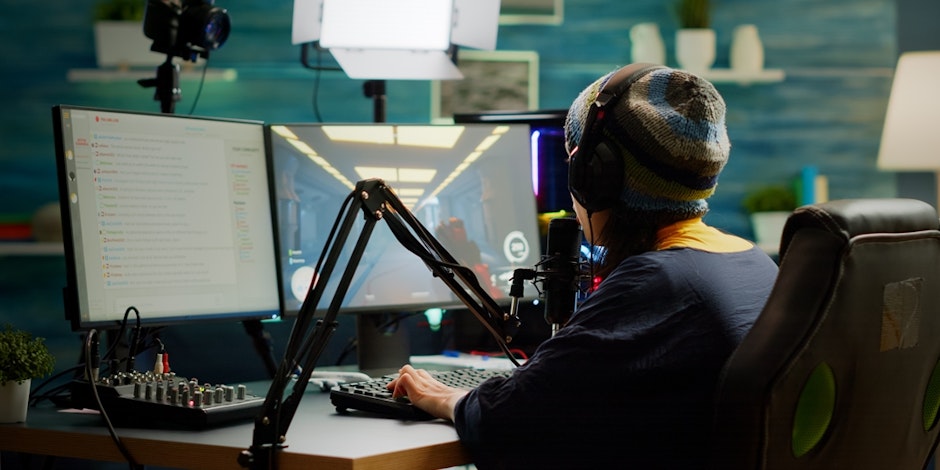Why Twitch influencers aren't just for gaming
When considering which services to focus on when running an influencer marketing campaign, Twitch might not be top of mind

Let's take a closer look at Twitch and how this service can help you, as a marketer, reach an engaged userbase of potential new customers in an innovative manner.
What is Twitch?
For those who are unfamiliar, Twitch is a video live streaming service with an emphasis on video games, esports and music. According to Backlink.io, Twitch sees 140 million unique visitors each month with 107,800 live broadcasts taking place at any given time.
In 2020, there were over 18.6 billion hours of content consumed. It's a true peer network with over 9 million Twitch users actively streaming at least once a month.
Why use Twitch for influencer marketing?
Twitch influencers, unlike their parent company's Amazon influencers, are less complicated to work with due to straightforward disclosure practices and a welcoming user base that actively seeks out such sponsored reviews.
Another advantage of using Twitch users for an influencer campaign is the costs associated with sponsorships tend to be less on an audience size basis when compared to its primary game streaming competitor, YouTube (based on research from Streamlabs).
As you can see from the above chart, in the world of gaming, Twitch is still king when compared against YouTube in terms of raw content consumed and audience interest. The year 2022 may show YouTube eating into that market share more. However, it's still a sizable lead.
Furthermore, Twitch influencers are becoming more organized and professional in their services. According to Intellifluence compensation data, an individualized stream sponsorships across networks can garner $0.10 per follower. Many Twitch influencers also supplement via varied tier-level ad revenue agreements with Twitch itself and subsequently will post their streamed videos on YouTube as well in order to maximize the ad revenue for the time spent streaming.
Finding successful gaming influencer campaigns doesn't take long when exploring Twitch for ideas. For instance PAAStreaming hosted a 7+ hour stream sponsored by Plays.org for a free to play Friday campaign. Properly tagged sponsorships aren't just easy, but are expected within the Twitch influencer community.
Besides gaming, what industries thrive beyond Twitch?
Since Twitch specializes in "come along with me" content, allowing a viewer to occasionally act as a participant in the content itself, anything experience-driven would have an expectation to thrive.
Consider the power of television travel and local eatery shows which have hosts providing a curated and edited view of navigating a foreign city, its entertainment, and food choices. Now consider an unedited stream of someone local to that city showing a live streaming audience how to find the best sushi on a crowded evening whilst dodging noisy cabs in a busy neighborhood. The real-time experience is the power of such streams. Restaurant reviews, food preparation and consumption, nightclubs, you name it. Just about any entertainment niche is capable of using live streamers in this manner.
The authoritative expert use cases more easily found on YouTube are primarily regulated to what one might consider 'how-to' educational niches. How to apply makeup, how to repair a kitchen sink, how to perform a magic trick are still nascent in Twitch, but are primed to grow quickly.
This style of evergreen content tends to excel more on YouTube, but with an ever-growing and diversifying audience on Twitch, the 'how-to' educational niche content is starting to find a home as well given the ability for Twitch influencers to stream their content initially and post later on YouTube.
For brands looking to showcase their products as the solution to a problem in a tutorial, the combination of a growing network audience that hasn't yet been saturated with such content and a young demographic equivalent to what exists on TikTok provides a significant trend-making opportunity.
What types of influencers work best on Twitch?
As discussed in the eBook efficacy primer on influencer marketing, there are several types of influencers that are capable of generating review-level content on each social network. In the case of Twitch, the aspirational celebrities are essentially the expert-level gamers and entertainers whom have amassed the largest followings. Especially when it comes to 'how-to' content such as speed runs and walkthroughs, experts are sought out.
However, as the content KPI shifts from education to entertainment, peer level influencers begin to make the most sense for brands. Considering the low cost of sponsorship as previously referenced, brands are able to run saturation campaigns to promote new products by highlighting specific use cases wherein influencers are simply using products and services as an experience. To potential customers, this approach appears far more natural than traditional advertising methods and should garner better results.
Key takeaways
- Twitch is a true peer network with over 9 million active users per month
- With straightforward disclosure practices, Twitch influencers comparatively are easy to work with
- Twitch currently dominates all other services in terms of raw content consumed and audience interest
- You can go beyond gaming to create niche "how-to" content on Twitch and crosspost on other services such as YouTube
- Consider the benefit of peer influencers when creating a Twitch influencer strategy

